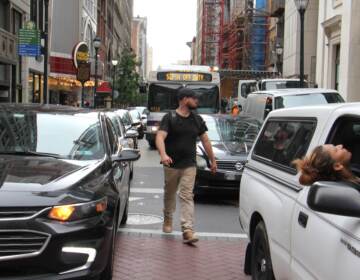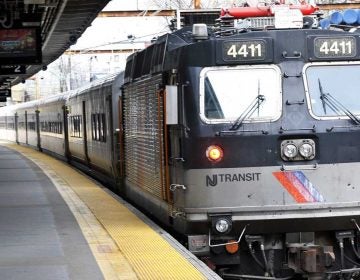NJ Transit is spending billions of dollars on a new fleet of buses. Here’s what to know
Critics say the service is unreliable and that communication is poor.
Listen 1:10
The first of 175 40-foot new Flyer buses ordered by NJ Transit arrived on Monday. NJ Transit President & CEO Kris Kolluri says the agency will replace or modernize every outdated bus and rail car by 2031. (Credit: NJ Transit)
From Camden and Cherry Hill to Trenton and the Jersey Shore, what about life in New Jersey do you want WHYY News to cover? Let us know.
The first of 175 new buses ordered by NJ Transit arrived in Newark on Monday. The remaining vehicles will be delivered by the end of next year, and then they will immediately be put into service in locations across the Garden State
Kris Kolluri, president and CEO of NJ Transit, said the new fleet is part of an ambitious modernization program that will improve service.
“The value proposition for our riders is pretty straightforward,” he said. “They want a good, clean, reliable bus system, and that’s what this commitment really means.”
Mike Kilcoyne, senior vice president, and surface transportation and general manager for NJ Transit bus operations, said the new fleet of 40-foot Flyer model buses will improve reliability for the 500,000 customers who travel by bus in New Jersey every day.
“These clean diesel buses meet the latest EPA standards, they are tier-4 emission buses,” he said. “They’ll be replacing tier-1 and tier-2 buses, making them significantly cleaner than the aging buses they are replacing.”
He said on some high-volume routes, to improve capacity, NJ Transit uses 60-foot buses.
“Forty-foot transit buses remain a vital part of our fleet strategy,” he said. “They ensure we have the right bus for the right routes at the right time.”
Ongoing NJ Transit problems with delays and cancellations
Improving reliability is a front-burner issue for NJ Transit, officials said. For years, passengers on buses and trains have complained about delays, cancellations, lack of communication and equipment breakdowns.
An analysis of train data found more than 5% of NJ Trains were delayed during May, June and July of this year. The study found NJ Transit passengers are much more likely to face a travel problem than commuters who use Metro-North or the Long Island Railroad.
On a hot August day in 2024, an NJ Transit train was stuck for hours with no air conditioning in an underground tunnel. Passengers suffered heat exhaustion and panic attacks, and many expressed anger about the crew’s lack of communication, failing to tell them what was going on.
U.S. Rep. Frank Pallone, D-N.J., called the situation unacceptable.
“We need immediate and effective action to ensure such a debacle never happens again. The safety and well-being of passengers must always come first,” he said.
Ten months ago, when overhead wire problems forced service to be suspended on the Northeast Corridor and North Jersey Coast lines, Pallone again called the problem “unacceptable” and said impacted passengers should be given refunds.
NJ Transit promises improvements
Kolluri said the plan to modernize NJ Transit’s rail system is on track, with 374 new multi-level rail cars on order, and 174 expected to be delivered by the end of next year.
“After that we’ll get the remaining 200 from then all the way to 2031,” he said.
He pointed out that since 2018, NJ Transit has bought a thousand new buses, costing $850 million.
“Just this year alone, from now all the way to 2031, we will be placing orders for another 1400 buses for a total of $1.7 billion,” he said.
State Department of Transportation Commissioner Fran O’Connor said the new buses feature several amenities.
“They come with USB charging ports, brighter LED lighting and improved intercoms,” he said. “And the low floor design makes boarding easier for seniors and customers with disabilities.”
He said the buses are equipped with safety features such as blind-spot cameras and turn-warning systems..
O’Connor said NJ Transit plays a crucial role in helping to keep the Garden State moving.
“Buses are central to that network, and for many communities they are the most reliable links to jobs, schools and health care,” he said.

Get daily updates from WHYY News!
WHYY is your source for fact-based, in-depth journalism and information. As a nonprofit organization, we rely on financial support from readers like you. Please give today.






